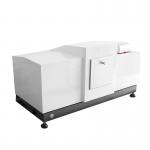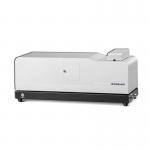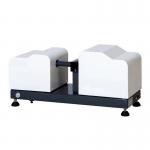Microcarrier Current Rubbing Wear Tester Micro-load Friction Wear
Testing Machine
Product Introduction
Under certain contact pressure, this machine exhibits a sliding
motion in the state of applied current, featuring a stepless speed
control system. It can be used to evaluate the friction and wear
properties of materials such as metals, plastics, coatings, rubber,
and ceramics at both low and high speeds, and it has a large
expansion space for friction pairs. For example, there are tests
such as low-speed drum-disc (with large and small discs, single
needle and three needles) friction functions, push washers,
ball-disc, mud wear, and lip sealing torque of rubber seals.
This testing machine is an integrated mechanical and electrical
precision testing instrument. It uses a stable spring support
self-stabilizing loading mechanism to ensure accurate force values.
The main shaft motor is a servo-integrated speed control system and
motor independently developed and researched. It has stable speed,
large torque, wide speed adjustment range, and low noise. The
measurement parameters include friction force, test time, test
cycle (rotations per minute of the main shaft). Various parameters
can be preset according to the material being studied to achieve
the best usage effect. When any parameter exceeds the preset value,
the corresponding alarm light will light up, and at the same time,
the main shaft will stop rotating. All measurement axis results can
be displayed in real time on the computer screen, and the test
curves will be recorded and saved.
Product Parameter
Test load | 50~5000g |
Loading method | Weight loading |
Support method | Single pivot (pivot adaptive) |
Main motor power | 1000W |
Maximum rotational speed (servo continuous speed regulation) | 3500 revolutions per minute |
Friction torque measurement range | 0 - 1500 N•mm (±0.2%Fs) |
Friction pair | Pin (bolt) disc friction |
Friction counter-bolt size | Φ3mm - Φ10mm or custom |
Sample disk size | ≤Φ180mm |
Contact point current measurement accuracy | 0.01mA |
Contact point voltage measurement accuracy | 0.01mV |







